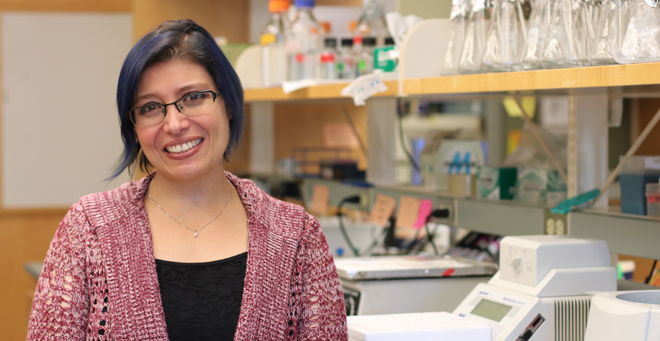 |
|
|
Teresita Padilla-Benavides |
Teresita Padilla-Benavides, PhD, instructor in biochemistry & molecular pharmacology, received the 2017 Society for Advancement of Chicanos/Hispanics and Native Americans in Science Outstanding Research and Professional Mentor Award. Dr. Padilla-Benavides received the recognition on Oct. 20 at the society’s annual meeting in Salt Lake City.
“It is a great honor to be part of a national society that cares so much to promote and advance the careers of underrepresented groups in science. I am humbled and honored for being a recipient of this mentoring award. I will continue to work hard on this endeavor, and support underrepresented minority students to achieve their professional goals,” she said.
Padilla-Benavides was chosen for the award because of her demonstrated record of encouraging underrepresented minority students to pursue advanced degrees in a science.
“It is a well-deserved honor,” said Anthony N. Imbalzano, PhD, professor of biochemistry & molecular pharmacology and Padilla-Benavides’ mentor. “Multiple students have or will have co-authored publications with Teresita. She is an outgoing, approachable and interactive mentor for these students, and I cannot imagine her running a lab without a cohort of young trainees exploring the world of biomedical science.”
Padilla-Benavides has opened her lab to summer undergraduates from the UMMS Summer Undergraduate Research program, in addition to students from Worcester Polytechnic Institute, Mt. Ida College and other UMass campuses. She has also obtained funding from the Mexican government to host graduate students from Mexico for 4- to 6-month stays.
“It’s important to talk with undergraduate students so they see that they can succeed,” she said. “I think it’s very important for young people to come to a setting like UMass Medical School. Here, they can experience failure, frustration and real world challenges and still nurture a love of science and discovery. The goal is to move them forward to a professional career in science. I want to give them what they need to be competitive.”
There are currently one graduate and three undergraduate students in Padilla-Benavides’ lab, which focuses on the biological roles of transition metals, such as copper, zinc, cobalt and manganese, in the development of mammalian cells.
“I’m very interested in how metals support development and differentiation. I really want to see how these metals affect development in a good way,” Padilla-Benavides said.
She is focused on moving the field of heavy metals biology from studies of metal homeostasis to studies examining a previously underappreciated role for heavy metal function in mammalian development, tissue differentiation and disease.
“Even in the moment of most stress, I love it. This is my dream come true,” she said.
Related story on UMassMedNow:
UMMS establishes chapter of national organization to advance Latinos/minorities in science
UMMS undergrad research program puts ‘best and brightest’ students in the lab